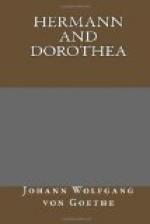Out of second-hand stuff that somebody doubtless has
given;
And we were pleased with her aspect: she seems
like a girl to be trusted.
Tell us whatever thou knowest: we ask it with
honest intentions.”
Soon as the magistrate nearer had come, and looked
into the garden,
“Her thou knowest already,” he said; “for
when I was telling
Of the heroic deed performed by the hand of that maiden,
When she snatched the man’s sword, and delivered
herself and her charges,
This was the one! she is vigorous born, as thou seest
by her stature;
Yet she is good as strong, for her aged kinsman she
tended
Until the day of his death, which was finally hastened
by sorrow
Over his city’s distress, and his own endangered
possessions.
Also, with quiet submission, she bore the death of
her lover,
Who a high-spirited youth, in the earliest flush of
excitement,
Kindled by lofty resolve to fight for a glorious freedom,
Hurried to Paris, where early a terrible death he
encountered.
For as at home, so there, his foes were deceit and
oppression.”
Thus the magistrate spoke. The others saluted
and thanked him,
And from his purse a gold-piece the pastor drew forth:—for
the silver
He had some hours before already in charity given,
When he in mournful groups had seen the poor fugitives
passing;—
And to the magistrate handed it, saying: “Apportion
the money
’Mongst thy destitute people, and God vouchsafe
it an increase.”
But the stranger declined it, and, answering, said:
“We have rescued
Many a dollar among us, with clothing and other possessions,
And shall return, as I hope, ere yet our stock is
exhausted.”
Then the pastor replied, and pressed the money upon
him:
“None should be backward in giving in days like
the present, and no one
Ought to refuse to accept those gifts which in kindness
are offered.
None can tell how long he may hold what in peace he
possesses,
None how much longer yet he shall roam through the
land of the stranger,
And of his farm be deprived, and deprived of the garden
that feeds him.”
“Ay, to be sure!” in his bustling way
interrupted the doctor:
“If I had only some money about me, ye surely
should have it,
Little and big; for certainly many among you must
need it.
Yet I’ll not go without giving thee something
to show what my will is,
Even though sadly behind my good-will must lag the
performance.”
Thus, as he spoke, by its straps his embroidered pocket
of leather,
Where his tobacco was kept, he drew forth,—enough
was now in it
Several pipes to fill,—and daintily opened,
and portioned.
“Small is the gift,” he added. The
justice, however, made answer:
“Good tobacco can ne’er to the traveller
fail to be welcome.”
Then did the village doctor begin to praise his canister.
But the clergyman drew him away, and they quitted
the justice.
“Let us make haste,” said the thoughtful
man: “the youth’s waiting in torture;
Come I let him hear, as soon as he may, the jubilant
tidings.”




